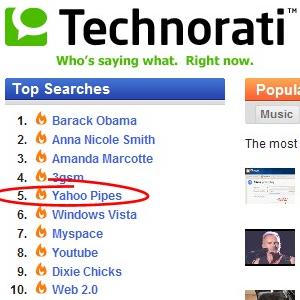Yahoo Pipes and the future of composite content

The buzz continues to build around Yahoo! Pipes, which is currently the fifth most popular search topic on Technorati, as recorded in the screenshot below, even edging Microsoft Vista into sixth place! It's winning attention because it answers a huge unmet need to filter, transform and reorder the raw information streaming out of RSS feeds all over the Web.

I'm still dubious whether there's enough discovery infrastructure in place to effectively harness all this creativity before the gloss of novelty starts to wear off, but if Pipes doesn't manage to some other tool will do so sooner or later. There is just too much pent-up demand for this kind of capability not to get satisfied eventually.
Parallel urges to remix information streams are surfacing elsewhere on the Web. An intriguing New York Times article last week described a new breed of virtual advertising agencies that offer "automated ad creation over the Internet":
"Advertisers use the new sites to select scenes from commercial films and customize campaigns with a few clicks of the mouse and little human interaction, often for a low flat fee ... They can automatically add names of local sales agents or dealership addresses, and they can change the content of the ad, depending on where it is showing, to appeal to various demographic groups."
When I read this, it triggered a link in my mind to reports that YouTube CEO Chad Hurley had aired "plans to financially compensate users who produce and upload their content." Although Hurley was talking about giving users a cut of advertising revenues earned when showing their content, there's clearly also scope to pay a usage license in cases where the content is put to commercial use, such as in one of those virtual ad creation sites.
Which brings us back to RSS, and all the different content creators who might seek to be compensated for their efforts in the Read/Write/Modify Web — not merely the content creators of the original RSS feeds but also the Pipes builders who put their creative skills to work building innovative remixes.
If composite content is the future of the Web, then what of the composite creators? I think that ultimately they'll win compensation for their efforts and that revenue-sharing and licensing mechanisms are part of the future of composite content on the Web. But that's a long way off in the future and certainly not built into the fabric of Yahoo! Pipes, which as Alex Iskold and Richard MacManus point out on the Read/WriteWeb website, is designed to help improve Yahoo!'s own search ad revenues instead.
More on Yahoo! Pipes: